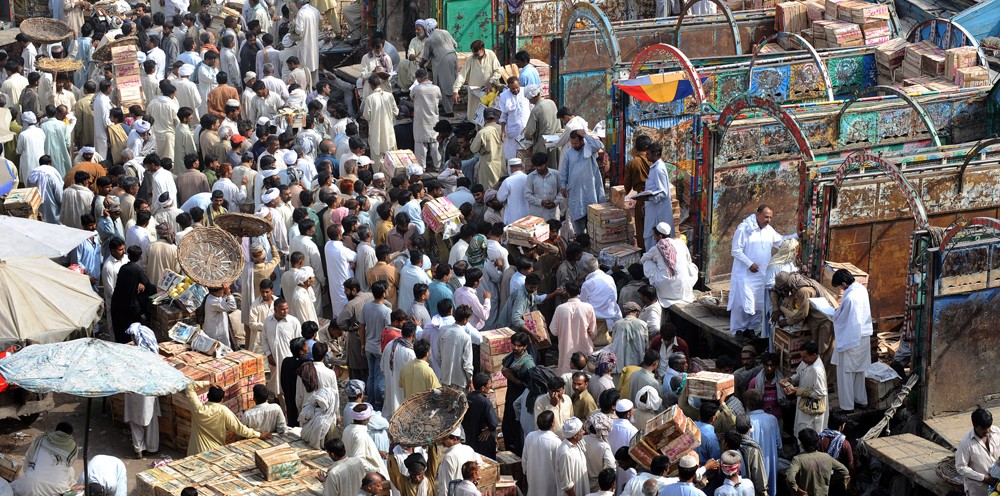
Consumers have so far not seen the trickle down effect of decrease in oil prices

Petrol prices have dropped about 23 per cent and another decrease is on the cards. However, no trickledown effect has so far reflected on the prices of daily commodities. After Prime Minister Nawaz Sharif announced decrease in petrol products people expected decrease in the prices of essential items.
Even if petrol price go down further, the situation is likely to remain unchanged. Why does it happen? Why the authorities concerned stay inactive? The answer to these questions revolves around a well-netted mechanism that regulates basic four areas -- plan of produce, cost of production, demand and supply chain and price control enforcement.
This is disappointing to note that Pakistan do not have any mechanism in place at the federal or provincial level. Whatever is functional is so sketchy to deliver. Successive governments paid lip service to make a system that could ensure daily items on affordable prices.
Agriculture Marketing Information Service (AIMS) Project Manager, Muhammad Ajmal, says consumers have never benefited from reduction in petrol prices as a regulatory mechanism that harnesses cost of production, supply and demand, and pricing is not available in the country. "In the world, such system is organised and everything is documented."
"Government designs farmers’ production plan, bring all produce to the market and subsidise them to keep prices within the budgetary range of consumers," he adds. He also supports efforts to restore magistracy system in the country to give relief to consumers.
Market deals with two group items -- perishable (mostly vegetable and fruits) and non-perishable (mostly packed). They may be exported or imported depending on the situation. Most of the market players dealing with perishable items include farmers, transporters, auctioneers, agents, wholesalers and retailers.
Farmer grows the crop. Handler drives the crop to the main market (vegetable and fruit market). Auctioneer in the market opens the bidding to sell. Agent connects purchaser and wholesaler on commission basis. Wholesaler sells it to the retailer and, finally, the product reaches to the hands of end consumers. This is the basic system of doing business that often has impact on the supply and demand as well as prices.
Everywhere in the world, every market player is registered and has license to do the business. They have their data that is shared with government authorities. Public departments regulate market actors. They determine what and how much is to be produced. They set the cost of production, keeping in view market dynamics. Having monitored supply and demand, they ensure pricing dynamism and violators have to pay heavy fines.
In Pakistan, only auctioneer is registered while no other market player has registration profile. The government contains no data about these unregistered market forces. In such situation, state machinery has no check and balance on them and these unregistered people mint money by unfair means and the consumer bears the brunt.
On paper, the government controls the markets through some bodies and committees. At the federal level, National Price Monitoring Committee, headed by Finance Minister Ishaq Dar, is in place. The Punjab government uses Punjab Prices Supply Board (PPSB), ministry of industries, agriculture department, Bureau of Statistics, 36 District Coordination Officers and 135 market committees in the province.
The Chief Minister Punjab, Shahbaz Sharif, has formed different committees and task forces for monitoring prices of essential items. These task forces and committees are affiliated with the prices wing of industries commerce and investment department.
All of them make their own statistical reports on daily, weekly, monthly and yearly basis. These reports are presented to the prime minister and chief ministers in meetings. Orders are issued which are not always followed.
The Ministry of Industries Deputy Director, Shamim Inam, says the government has been planning to restore executive magistracy in provinces to stop overpricing. The executive magistrate, he claims, "will have sweeping powers as exercised in the past to tighten control on market. This will make a difference," he adds. "So far we control only 18 items and after collecting data from all DCOs send complete report to the CM," he informs.
A senior official in National Price Monitoring Committee says on the condition of anonymity that the government has no control over the market players. "Profiteers, hoarders, and black marketers have made a strong cartel. They play their role in the guise of government officials, growers, transporters, agents, wholesalers, retailers, importer, exporters and this phenomenon leads to inflation," he says.
Under the Price Control and Prevention of Profiteering and Hoarding Act, 1977, only 26 items like tea, white sugar, edible oil, potatoes, onion, meat and others are monitored.
A senior official in the Chief Minister’s secretariat says that this law needs to be amended as per new demands. The agriculture and industry department deals with 26 essential commodities. "What about other eatables and others used often by consumers," he questions.
Surprisingly, the government has not constituted any department or authority to regulate the prices of packed milk, cosmetics, paper, medicines, kids’ items, garments, footwear, additives, mineral water, imported meat and fish and several importer items produced by multinational companies in the market. They are free to increase prices whenever they want. Despite the prevailing inflation, Finance Minister Ishaq Dar has claims that inflation has come down to 5.8 percent, which is the lowest in the last 18 months.